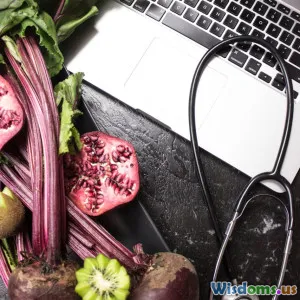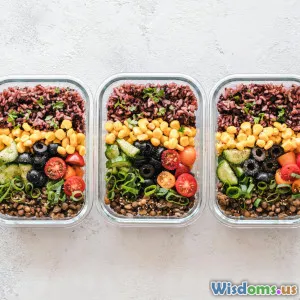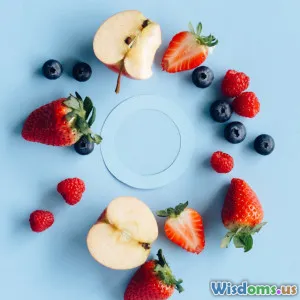
Top 5 Superfoods for a Healthier Diet
7 min read Discover the top 5 superfoods that can transform your diet and enhance your well-being. (0 Reviews)
Top 5 Superfoods for a Healthier Diet
Eating for optimal health involves more than just cutting calories or avoiding particular food groups; it's about incorporating nutrient-rich foods that provide your body with the necessary elements to function and thrive. Among these are superfoods—nutrient-packed foods that are beneficial for health and well-being. Here, we'll explore the top five superfoods to kickstart your journey to a healthier diet.
What Are Superfoods?
The term “superfood” refers to foods that are exceptionally rich in nutrients, antioxidants, vitamins, and minerals. They may help combat diseases, lower cholesterol, boost cardiovascular health, and even aid in digestion. While no food is a miracle cure, integrating superfoods into your diet can certainly improve your overall health.
1. Blueberries: Nature’s Antioxidant Powerhouse
Nutritional Profile
Blueberries are often hailed as one of the most nutritious fruits available. They are packed with antioxidants, especially flavonoids, which are linked to numerous health benefits.
Key Benefits:
- Anti-Aging Effects: Studies show that regular consumption of blueberries may slow cognitive decline associated with aging. A study published in Frontiers in Aging Neuroscience noted that participants who consumed blueberries showed improved memory functions due to their high levels of antioxidants.
- Heart Health: Blueberries contribute to cardiovascular health by improving cholesterol levels and promoting healthy blood pressure.
How to Include Them in Your Diet
Add blueberries to your morning oatmeal, yogurt, or blend them in smoothies. You can also incorporate them into salads or eat them on their own as a healthy snack.
2. Kale: The Green Superfood
Nutritional Profile
Kale, a member of the cruciferous vegetable family, is renowned for its rich supply of vitamins A, C, and K, alongside vital minerals like calcium and potassium.
Key Benefits:
- Nutrient Density: It is extremely low in calories but provides high nutritional benefits. Just one cup of cooked kale contains approximately 1110% of the daily recommended value of vitamin K!
- Anti-Inflammatory Properties: A study published in The American Journal of Clinical Nutrition revealed that compounds in kale reduce inflammation, potentially decreasing the risk of chronic diseases.
Ways to Consume Kale
You can enjoy kale in various forms—steamed, sautéed, or raw in salads. Kale chips have also become a trendy snack that provides all the benefits without the guilt.
3. Quinoa: The Complete Protein
Nutritional Profile
Quinoa, often referred to as a super grain, is a gluten-free seed that offers a unique combination of all nine essential amino acids, making it a complete protein.
Key Benefits:
- Balancing Blood Sugar: According to a Nutrition Journal study, quinoa’s low glycemic index helps control blood sugar levels, making it an excellent choice for diabetics.
- Digestive Health: Being high in fiber, quinoa promotes digestive health and helps maintain a healthy weight.
How to Integrate Quinoa into Meals
Quinoa can be used as a base for salads, served as a side dish, or blended into soups. Many people also use it as a substitute for rice or pasta.
4. Salmon: The Omega-3 Rich Fish
Nutritional Profile
Salmon is renowned for its high levels of omega-3 fatty acids, particularly EPA and DHA, which are fundamental in maintaining a healthy heart and brain.
Key Benefits:
- Heart Health: The Journal of the American Heart Association highlighted that regular fish consumption, particularly fatty fish like salmon, can significantly reduce the risk of heart disease.
- Cognitive Function: Omega-3 fatty acids are crucial for brain health, and several studies suggest they may also help prevent Alzheimer's disease and dementia.
Ways to Enjoy Salmon
Salmon can be grilled, broiled, baked, or consumed smoked. Pair it with a variety of sides or incorporate it into breakfast dishes for added protein.
5. Chia Seeds: Tiny Yet Mighty
Nutritional Profile
Chia seeds are packed with fiber, protein, healthy fats, and essential minerals. Despite their small size, they are nutritionally mighty.
Key Benefits:
- Weight Management: Chia seeds swell up to 10-12 times their weight when soaked, promoting a feeling of fullness that aids in weight loss.
- Bone Health: They are rich in calcium, phosphorus, and magnesium, which are essential for bone density.
Incorporating Chia Seeds
Chia seeds can be added to smoothies, puddings, or baked goods. You can also top oatmeal or yogurt with them for a nutritional boost.
Conclusion
Incorporating superfoods into your diet can be an effective way to enhance your nutritional intake and overall health. By focusing on nutrient-dense options like blueberries, kale, quinoa, salmon, and chia seeds, you can empower yourself to live a healthier lifestyle. Start integrating these superfoods into your meals and feel the difference it can make in your energy levels, cognition, and wellness.
Whether you choose to blend smoothies or whip up a kale salad, the options are endless. Embrace the vibrant flavors and empowering health benefits of superfoods, fostering a more nourishing relationship with what you eat. Your body deserves it!
Rate the Post
User Reviews
Popular Posts



















